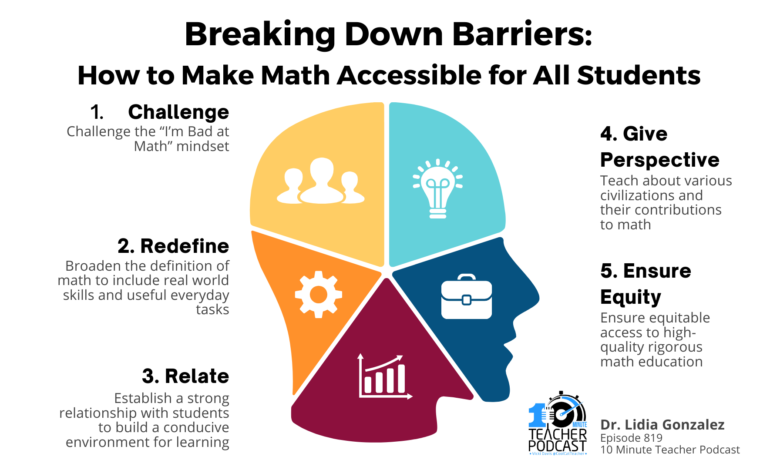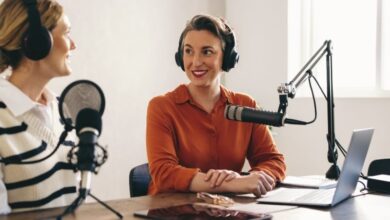How to Make Math Accessible for All Students

00:00:00:22 – 00:00:04:06
John D.
This is the Ten Minute Teacher podcast with your host, Vicki Davis.
00:00:04:10 – 00:00:33:21
Vicki Davis
Today’s sponsor is Microsoft Education. Stay tuned at the show’s end to learn more about their artificial intelligence course for educators.
I’m so excited about talking to Dr. Lidia Gonzalez today because so many issues happen with understanding how we can reach every single student with math. She is the author of “Bad at Math: Dismantling Harmful Beliefs That Hinder Equitable Mathematics Education,” published by Corwin Press.
00:00:33:22 – 00:00:37:06
Vicki Davis
So, Lidia, that’s a great title. Why did you write the book?
00:00:37:08 – 00:00:55:09
Dr. Lidia Gonzalez
It basically really troubles me that a lot of people are so comfortable saying that they’re bad at math, and we’re talking people across all different fields. People with all different levels of education will just openly admit that they’re not good at math. But you would be ashamed to say you don’t know how to read. And so it doesn’t sit well with me that so many people are so comfortable saying this.
00:00:55:09 – 00:01:10:11
Dr. Lidia Gonzalez
And I think that the fact that our society accepts this is one of the reasons why it’s sort of difficult to get everyone on board and to make it so that the majority of students excel at it because there’s like this way out, right. It’s okay to not be good at it.
00:01:10:15 – 00:01:32:07
Vicki Davis
Right. I teach technology, and if I ever have a student who says technology doesn’t like me, I have to deal with that belief before I can teach that student because they’re excusing and they don’t have a growth mindset. They have a fixed mindset. This is how I am. This is how I always will be. So what are some of the things that we have to dismantle those harmful beliefs besides just saying I’m bad at math?
00:01:32:10 – 00:01:55:20
Dr. Lidia Gonzalez
That it’s socially acceptable to say one is bad at math is definitely one thing we have to work on. But also even just how we define math, a lot of people, when they think about math, think about numbers and equations, and that’s sort of a very narrow definition. If we think about math as sort of like a study of patterns, then a lot of what we do in our everyday lives falls into math.
00:01:55:22 – 00:02:16:22
Dr. Lidia Gonzalez
So you’re picking up stuff at the grocery store and putting them in the cart so they all fit. And that’s actually a math problem, right? Like grocery shopping, getting stuff to fit in the cart. But you might not think that that’s math. So you might look at yourself and say, “Well, I’m not very good at this. I don’t really like it,” because you’re not looking at this in a broad way where most everything you do every day revolves around that.
00:02:17:01 – 00:02:30:17
Vicki Davis
I’ll tell my students when they say that, “Well, do you want to have money and do you want to be good at money?” And they’ll say, “Well, yeah.” It’s like, “Well, you need math so that you can manage your money and take care of your family. And that’s just part of life, right?”
00:02:30:18 – 00:02:42:09
Dr. Lidia Gonzalez
Yeah, definitely. I would challenge people to find things that they do in their everyday life that doesn’t involve some kind of math. And I think that would be hard to do, but only if we have this broad view of what math is.
00:02:42:12 – 00:03:04:03
Vicki Davis
So is that what a teacher or an administrator does when they hear a student say, “I’m bad at math,” or a parent say in a conference, “Well, I’m bad at math too?” When they say that, what should we do? You said apply. Get some real-world examples. What is the most productive way to do that? That’s not a shaming response, but an encouraging one.
00:03:04:05 – 00:03:28:20
Dr. Lidia Gonzalez
You were saying about having a growth mindset. I think the word that really helps us is “yet,” to look at it as, “You know what, you might not be very good at math yet, but that doesn’t mean that you can’t be successful going forward,” and then find tasks and activities where that student is successful and keep reminding them that what you just did, you just did some math there and you were really good at it because most students are certainly capable of doing the work.
00:03:28:20 – 00:03:46:14
Dr. Lidia Gonzalez
It’s just the mindset sometimes gets in the way. And with parents who I would get that all the time as a high school teacher or a high school math teacher. “Well, I wasn’t very good at it either.” And it’s sort of like, “Oh, but to say, well, you know, but I think your student could be great at it.”
00:03:46:14 – 00:03:55:16
Dr. Lidia Gonzalez
It’s just a matter of working on it and finding ways we can support the student and things of that nature. But that little word “yet,” I think, goes a long way.
00:03:55:17 – 00:04:02:13
Vicki Davis
Well, not yet. And that’s great with a growth mindset for anything. Are there any other harmful beliefs that we need to address?
00:04:02:15 – 00:04:23:15
Dr. Lidia Gonzalez
Sure. Some people think that math is neutral and that teaching math, you don’t really have to pay attention to student identities, for example. But this is just a neutral subject that I teach devoid of anything. But if we really want to engage students, then building on their histories and their experiences is important. And it’s important in math, just as it’s important in other subjects as well.
00:04:23:15 – 00:04:28:18
Dr. Lidia Gonzalez
So that’s another thing that we can work at, finding ways to connect the math to the students in your class.
00:04:28:19 – 00:04:46:23
Vicki Davis
To Lidia, if you could travel back in time and talk to Lidia, the first-year math teacher, and travel back and coach yourself, think of a situation that you dealt with and how you would tell yourself, knowing what you know now, how to deal with that situation.
00:04:47:01 – 00:05:09:18
Dr. Lidia Gonzalez
That my experiences going through school were sometimes very different from my students and I didn’t quite get that, so I didn’t always know where they were coming from why they might look at a problem a certain way, or why they might be acting a certain way. In class, a student would have their head down, and I would knock on their desk like, “Wake up, what’s going on?”
00:05:09:20 – 00:05:29:07
Dr. Lidia Gonzalez
Because in my mind, well, you must not care about class if you’re doing that. But I never stopped to, like, ask why. And then, one day, there was a student with his head down, and I have no idea why that day I said, “What’s going on? Why is your head down?” And he explained that his uncle had been arrested and he was watching his nephew’s up till like three in the morning.
00:05:29:07 – 00:05:45:05
Dr. Lidia Gonzalez
And the fact that he made it to school the next day was a really big deal. And I didn’t stop and ask those questions before. So I think that if I went back in time, I would say the math is really important. But building relationships and knowing where your students are coming from, that matters a great deal.
00:05:45:05 – 00:06:01:12
Vicki Davis
That touches my heart because we have to relate to educate. And I know I remember the first time I did that it may not have even been my first year. I think it was maybe my second or even early in my third. And I had a student who was just acting out in a way he never had before.
00:06:01:12 – 00:06:20:06
Vicki Davis
And I used to just deal with the behavior. But I actually took the student out of the room and I said, “What’s going on?” And she said, “My parents told me they’re getting a divorce this morning.” And you’re like, “There’s some things that are just going on in their lives and we don’t have a transparency to see that.”
00:06:20:06 – 00:06:22:19
Vicki Davis
And that’s just such a powerful story.
00:06:22:19 – 00:06:44:23
Dr. Lidia Gonzalez
Lydia, thank you. There was also I taught during a time when there was a transit strike in New York, and very few students made it to school during those days. I mean, it was impossible, right? There was no public transportation. A lot of our students lived quite a distance. But what was really nice is that we all had lunch together because it was such a small number of students and faculty that were there.
00:06:45:01 – 00:07:06:12
Dr. Lidia Gonzalez
And I had a group of students there, and I had, you know, where do you live? How did you make it here? They lived on 100, and something street, and our school was on 16th, and they walked, and I was like, you know, like, we’re not giving these students enough credit like this is amazing that you walked all the way to school so you wouldn’t miss it on a day where it was very easy for you not to because there was no easy way of getting here.
00:07:06:14 – 00:07:11:18
Vicki Davis
So do you remember what those breakthrough relationships did for their learning of math?
00:07:11:22 – 00:07:31:02
Dr. Lidia Gonzalez
You know, if your teacher believes in you or not. And so I think that once you establish some sort of connection, that that makes it a lot easier for the student to learn the math to come to you if they have questions, to be honest about what they do and do not get into like give it a good go at it, I think that that’s essential.
00:07:31:04 – 00:07:50:12
Vicki Davis
And you know what? Students are not always going to be transparent with us, but if we can always remember that there’s a reason that they do what they do, not that we’re going to excuse inappropriate behavior, but if we can relate to them as a human being and know that, hey, there’s more here than they may be telling me, then that will help teach difficult subjects because they know that you care, right?
00:07:50:13 – 00:08:04:04
Dr. Lidia Gonzalez
You don’t always know what’s going on. So whatever the first thought is that this must be because of this. It’s probably five other reasons that it could be. And if we don’t stop to think about it, we might alienate students that really could benefit from someone just sitting down and talking to them.
00:08:04:04 – 00:08:08:01
Vicki Davis
So your passion is math, but you’re talking relationship here?
00:08:08:03 – 00:08:17:02
Dr. Lidia Gonzalez
I think so. I didn’t know where we would go today, but if you don’t have a good relationship with your students, then it doesn’t matter how much math you’re trying to get across. It probably won’t.
00:08:17:02 – 00:08:32:09
Vicki Davis
Work. So as we finish up dismantling the harmful beliefs that hinder equitable mathematics education, you said math is not neutral. What do you mean? And how can math in all teachers understand that better?
00:08:32:09 – 00:08:56:22
Dr. Lidia Gonzalez
I think there’s a couple of things to do with that. One is who has access to high-quality, rigorous math instruction. So issues of access making it non-neutral, but also the content we teach. So every civilization that we know about has had some sort of math, even if our enumeration system let’s go with that. Even if it was something as simple as one to many, a lot.
00:08:57:00 – 00:09:22:20
Dr. Lidia Gonzalez
But when we went through school, we probably only learned about the Roman numerals. So why did we only learn about the Roman numerals? Why didn’t we learn about the Egyptian enumeration system or the Mayan enumeration system, the Babylonian enumeration system? So even what we teach and who we attribute it to, like we teach Pascal’s triangle and we call it Pascal’s triangle, but other civilizations knew about it way before that, and they’re not necessarily getting the credit for it.
00:09:22:20 – 00:09:44:19
Dr. Lidia Gonzalez
So there’s issues of like what we teach, whose math gets taught, who is featured in the textbooks, how many people can name like a female mathematician or can name a mathematician of color? What gets taught, whose math gets taught, who gets the credit, and then also who has access to the type of rigorous math that will benefit them going forward.
00:09:44:19 – 00:10:12:21
Vicki Davis
So Dr. Lidia Gonzalez, author of “Bad at Math: Dismantling Harmful Beliefs That Hinder Equitable Mathematics Education.” Thank you, Lidia, for coming on the show and for your passion for kids and for excellent teaching of math, which is something we all need to understand. Thanks. Microsoft has an amazing artificial intelligence course for educators that will help you and your education team have the knowledge you need to understand the best practices for artificial intelligence in schools.
00:10:13:03 -00:10:49:23
Vicki Davis
Microsoft has an amazing artificial intelligence course for educators that will help you and your education team have the knowledge you need to understand the best practices for artificial intelligence in schools. AI is changing rapidly, and you’ll want your team to take advantage of this free course from Microsoft today. Go to aka.ms/AIforEducators.
Now that aka.ms/AIforEducators sign up for this free course today so that you’re ready to understand and use AI in your school in ways that are safe and work for schools. I highly recommend this free AI course from Microsoft. So sign up today.
00:10:50:00 – 00:11:02:11
John D.
You’ve been listening to the Ten Minute Teacher podcast. If you want more content from Vicki Davis, you can find her on Facebook, TikTok, Instagram, and YouTube at Cool Cat Teacher. Thank you for listening.



